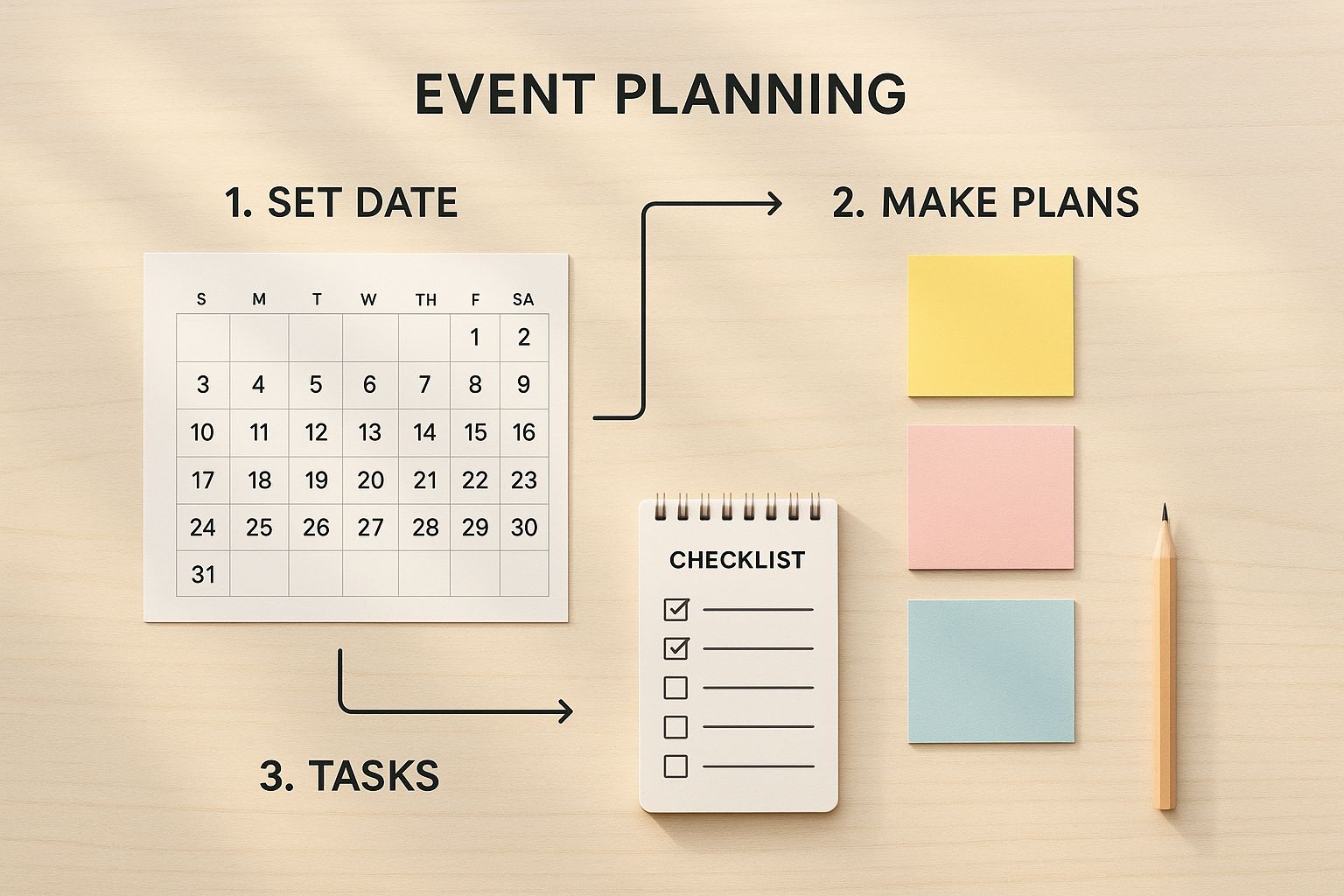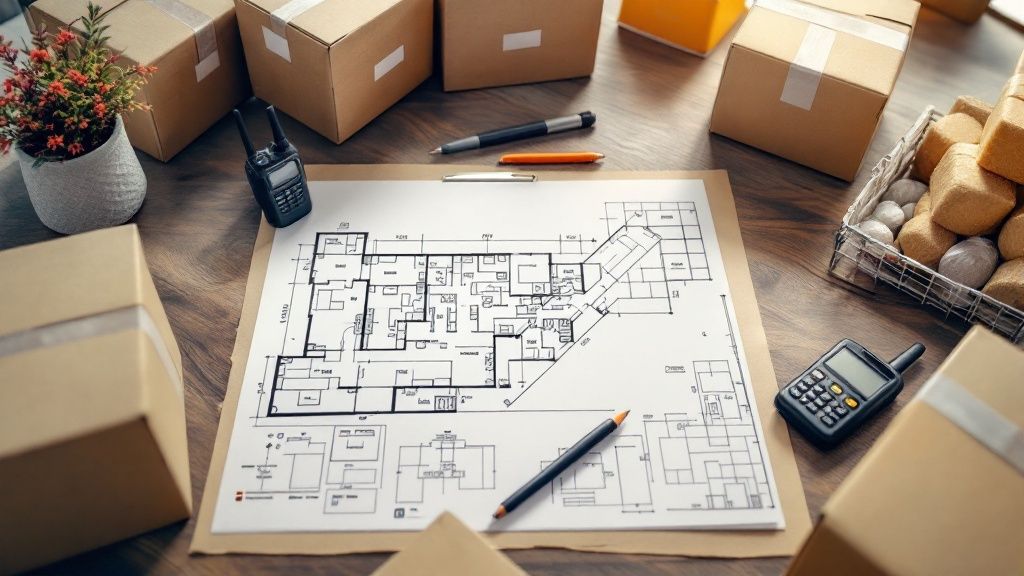Ever wondered what makes a huge conference or a packed music festival run so smoothly? That's event coordination at its finest. It's the practical, on-the-ground work of managing all the moving parts to bring an event vision to life.
The Architect and The Builder of Events
Let's use an analogy. An event planner is like an architect. They're the ones dreaming up the blueprint for an incredible building, figuring out the vision, location, theme, and budget months or even years ahead of time.
The event coordinator? They're the general contractor on the construction site. Their job is to take that blueprint and actually build the thing—managing the crew, the materials, and the schedule to make it all happen on the day.
Simply put, planning is about the what and why. Coordination is all about the how and when. It's a role that lives in the moment, focused entirely on flawless execution.
A great planner creates the vision, but a great coordinator ensures that vision is flawlessly executed when the curtains rise. They are the masters of on-the-day logistics, turning strategic plans into memorable experiences.

Event Planner vs Event Coordinator Key Differences
To really get a feel for what event coordination is, it helps to see how it differs from event planning. While the two roles are deeply connected and often collaborate, their main responsibilities are quite distinct. One is focused on the big-picture strategy, while the other thrives on tactical, real-time management.
This table breaks down their core functions.
| Responsibility | Event Planner (The Architect) | Event Coordinator (The Builder) |
|---|---|---|
| Primary Focus | Big-picture vision and strategy | On-the-ground execution and logistics |
| Timeline | Months or years in advance | Weeks leading up to and day-of the event |
| Key Tasks | Budget creation, venue selection, theme design | Vendor management, creating timelines, on-site problem-solving |
As you can see, the planner lays the foundation, but the coordinator is the one making sure everything is built to spec, on time, and ready for guests to enjoy.
What an Event Coordinator Actually Does
So, what does an event coordinator really do? If the event planner is the architect drawing up the blueprints, the coordinator is the on-site foreman making sure the entire structure gets built perfectly, brick by brick. They live in the details, turning a grand vision into a tangible, smoothly-run reality.
Think of them as the event's air traffic controller. They're the central hub for every vendor—the caterer, the DJ, the AV crew, the venue manager. It’s a constant whirlwind of calls, emails, and confirmations, all to keep every single moving part perfectly synchronized.
Juggling Logistics and Master Timelines
An event coordinator's bible is the master timeline, often called a "run of show." This isn't just a simple schedule; it's a meticulously crafted script for the entire event, mapping out everything from the first vendor's arrival to the final guest's departure.
Getting this logistical puzzle right is everything. Their key responsibilities include:
- Vendor Wrangling: Locking in arrival times, confirming setup requirements, and making sure every supplier gets paid on time.
- Managing the Flow: Guiding guests, running the check-in desk, and giving speakers the cue to hit the stage.
- Tech Checks: Leading rehearsals with the production team to dial in sound, lighting, and presentations before the doors open.
- The Aftermath: Overseeing the post-event teardown to leave the venue exactly as they found it.
It's this obsession with detail that makes all the difference. While planners and coordinators work together, their roles are very different. We break it down even further in our guide on the event coordinator vs event planner.
The On-the-Ground Problem Solver
Let's be real: no event ever goes 100% according to plan. The keynote speaker gets stuck in traffic. The microphone cuts out mid-speech. When chaos strikes, the coordinator is the calm in the storm, the firefighter who puts out the blaze before anyone even smells smoke.
The coordinator is the ultimate problem-solver on the ground. Their ability to manage unforeseen challenges with grace is what separates a chaotic event from a seamlessly executed one.
Keeping an eye on the bottom line is also a huge part of the job. Coordinators are constantly tracking expenses, processing invoices, and making sure every dollar is accounted for. Many rely on tools like an Event Budget Allocator tool to stay on track. This skill is more valuable than ever, especially in a global events industry projected to be worth around $1.35 trillion. You can find more stats on the growth of the events industry on eventgroove.com.
The Event Coordination Process Step by Step
Great event coordination isn't a single task; it's a journey with a clear beginning, middle, and end. Think of it like directing a movie. You have the pre-production phase where everything is meticulously planned, the actual filming on set, and then post-production to wrap it all up.
Each stage is critical for turning a great idea into a tangible, memorable experience. It’s a process that ensures nothing slips through the cracks.
The flowchart below shows how these phases flow into one another.

You can see it's a continuous loop, where the lessons from one event make the next one even better.
Pre-Event: The Confirmation Stage
This is where all the puzzle pieces get locked into place. The event coordinator gets on the phone and dives deep into the plan, confirming every last detail with vendors. They create the master timeline—what we call the "run-of-show"—and double-check that every contract is signed and sealed.
At this point, they become the communications hub. The caterer, the AV crew, the venue manager… everyone is working from the same script, all thanks to the coordinator. For a closer look at this foundational work, take a peek at our guide on how to plan a successful event.
On-Site: The Execution Stage
Once the doors open, the coordinator’s hat changes. They go from being a planner to being a live director on the ground. Their entire focus is on bringing the plan to life, managing the crew, and being the go-to person for any curveballs.
You really see a coordinator's worth on the day of the event. They are the calm in the eye of the storm, fixing problems behind the scenes so guests don't see anything but a perfectly smooth experience.
They're the ones cueing the speakers, keeping an eye on the clock, and making sure the whole day flows naturally. If the microphone suddenly dies or a delivery is late, the coordinator is already on it, finding a solution before anyone even notices.
Post-Event: The Wrap-Up Stage
The lights come up and the guests have gone home, but the job isn't done. The final phase is all about a clean finish. This means overseeing the entire breakdown of the venue, making sure it's left exactly as it was found.
The coordinator also handles the final invoices, sends out thank-yous, and gathers feedback from everyone involved. This last step is priceless—it’s how you measure what worked and discover how to make the next event an even bigger success.
The Skills That Make an Event Coordinator Truly Great
Knowing the process is half the battle, but what really separates a good event coordinator from a legendary one? It’s all about the soft skills—the stuff you can’t always teach from a textbook.
Being organized is the bare minimum. The real magic happens when a coordinator can handle the beautiful, controlled chaos of a live event without breaking a sweat. Because let's be honest, something always goes sideways.
Staying Cool When Things Get Hot
Picture this: your main speaker is stuck in traffic, or the catering team just brought the wrong appetizers. This is showtime for a great coordinator. They don't panic; they get to work.
It all comes down to a few key abilities:
- Thinking on Your Feet: The best in the business can diagnose a problem in seconds and cook up a solution before anyone even knows there was an issue.
- Making the Call: They aren't afraid to make quick, confident decisions. Whether that means rejigging the entire run-of-show or finding a last-minute replacement, they act decisively.
- Communicating with Confidence: They keep the client in the loop and the team on the same page with calm, clear instructions. No drama, just solutions.
Think of a great coordinator like a duck on a pond—calm and cool on the surface, but paddling like crazy underneath. They have a plan B, C, and D for every possible scenario.
This knack for improvisation is what turns a potential disaster into a tiny blip that no one even remembers. It's about expertly managing the unexpected to create a flawless experience. If you're looking to build these instincts, diving into some practical event planning tips is a great place to start.
At the end of the day, event coordination without these skills is just a to-do list. With them, it’s an art.
How Technology Is Reshaping Event Coordination

Gone are the days of running an event with just a clipboard and a walkie-talkie. Today, technology is the backbone of any well-run event, giving coordinators the power to manage every moving part with incredible accuracy.
Think of modern event management software as the digital mission control. These platforms pull everything together, from handling guest lists and ticket sales to sending out live updates through a mobile app. It's not just about convenience; it’s about creating a smooth, connected experience for everyone from the moment they register to the final farewell.
The Rise of Virtual and Hybrid Experiences
Technology hasn't just changed how we run events—it's changed what an event can even be. Virtual and hybrid events are now a huge part of the industry, and that means coordinators have had to get savvy with a whole new set of digital tools.
The virtual event market is already massive, expected to hit $237 billion, and it's on track to more than double. In fact, around 63% of organizers are planning to spend even more on their virtual offerings. This shift means mastering new platforms is non-negotiable for creating experiences that feel just as engaging on a screen as they do in person.
In a way, technology lets a coordinator be in ten places at once. With the right tools, they can watch the check-in flow, push a last-minute room change to everyone's phone, and see which sessions are getting the most buzz—all from a single tablet.
Tools That Boost Engagement and Impact
Beyond the big management platforms, a whole arsenal of tools helps coordinators craft a more memorable experience for attendees. Interactive tech like live polls and app-based Q&A sessions can transform a passive audience into an active part of the conversation.
Here are a few ways we see tech making a real difference:
- Real-Time Analytics: We can now see exactly which speakers or topics are hitting the mark by tracking session attendance and engagement data on the fly. This gives us priceless feedback for planning future events.
- Sponsorship Integration: Tech creates new and better ways to feature sponsors. Digital platforms can open up a world of opportunities, which we cover in our guide on how to find event sponsors.
- Enhanced Communication: Need to announce a schedule change or a surprise guest? Push notifications let us instantly get the word out to every attendee, keeping the event running without a hitch.
If you’re curious about how tech is changing other service-focused fields, it's worth checking out these key hospitality technology trends. At the end of the day, these tools help us deliver events that are more dynamic, engaging, and flawlessly executed.
So, Is Professional Event Coordination Actually Worth It?
Let's be honest, hiring a professional event coordinator can feel like an extra expense. But thinking of it as a luxury is a huge mistake. It's actually a strategic move to protect your investment and make sure your event actually delivers on its promise.
While the planner is the architect who designs the blueprint, the coordinator is the general contractor on-site, making sure every single nail is hammered in correctly. Their logistical wizardry isn't just about making things run smoothly; it’s about preventing those expensive, cringe-worthy mistakes that can sink an event.
Think about it. One tiny technical glitch with the microphone or a catering vendor running 30 minutes late can throw the entire schedule—and atmosphere—into chaos. A coordinator's real job is to see those problems coming and snuff them out before anyone, especially your guests, even notices.
It's All About the Return on Experience
So, what’s the real payoff? Simple. A coordinator turns a great plan into a smash hit that achieves its goals.
For a corporate conference, that means generating solid leads and building real relationships. For a wedding, it means creating those once-in-a-lifetime memories without a single hiccup. And for a fundraiser, it’s about creating an atmosphere that inspires people to give generously—something we’re passionate about with our nonprofit event planning services.
At the end of the day, professional coordination is that last, critical puzzle piece. It's what ensures your event’s big-picture goals are met by making sure every tiny detail, from the moment guests arrive to their final goodbye, adds up to something powerful and memorable.
By handing over the on-the-ground execution, a coordinator frees you up to actually enjoy your own event. You can focus on your guests, network, and soak it all in, knowing your investment is in expert hands.
Got Questions About Event Coordination? We've Got Answers.
Jumping into event coordination can feel like learning a new language. Whether you're thinking about planning your own party or even making a career out of it, getting a handle on the details is key. Here are some of the most common questions we get, with straight-up answers from our experience.
Can I Just Hire a "Day-Of" Coordinator?
Yes, and honestly, it’s a brilliant move. Lots of people love the creative side of planning—picking the theme, choosing the food, designing the invites—but want to hand over the stress when the big day arrives. That's where a "day-of" coordinator comes in.
They usually jump on board a few weeks out to get the full picture. Their job is to:
- Soak up every single detail of your plan.
- Become the go-to person for all your vendors.
- Build a rock-solid timeline for the event itself.
- Run the show on-site so you can actually be a guest at your own party.
It’s the perfect setup: you get to be the visionary, and they make sure it all happens without a hitch.
What’s the Very First Thing an Event Coordinator Does?
After you've hired them, the first thing a coordinator does is a deep dive. They'll set up a big meeting with you to learn everything there is to know about your event. This isn't just a quick chat; they're reviewing every signed contract, getting a grip on the budget, and really understanding the goal of the whole thing.
That first handover is everything. A coordinator’s job is to become an instant expert on your event. They’ll ask a ton of questions to understand the 'why' behind every choice you've made.
Once they have the full story, they start building out the master timeline and introducing themselves to everyone involved.
How Do Coordinators Deal with Last-Minute Disasters?
Let's be real: things go wrong. A sudden thunderstorm, a DJ's equipment failure, a key supplier running late—it happens. Experienced coordinators are pros at putting out fires.
They tackle problems from two angles: planning ahead and thinking on their feet. They always have backup plans for the usual suspects (like bad weather). When something totally unexpected happens, they stay cool and use their network to find a solution, fast. The goal is to handle the chaos behind the curtains so that you and your guests never even know there was a problem.
Ready to feel that calm confidence on your event day? The team at 1021 Events lives and breathes this stuff. We're all about turning your vision into a perfectly run, amazing experience. Let's create something amazing together.




